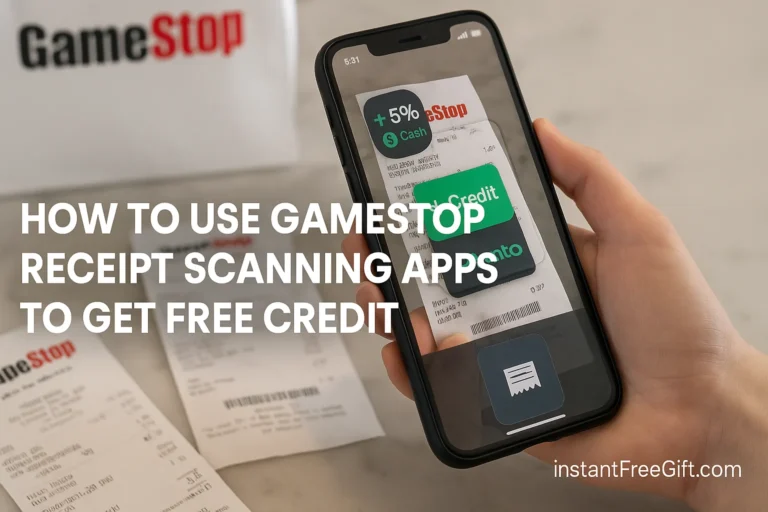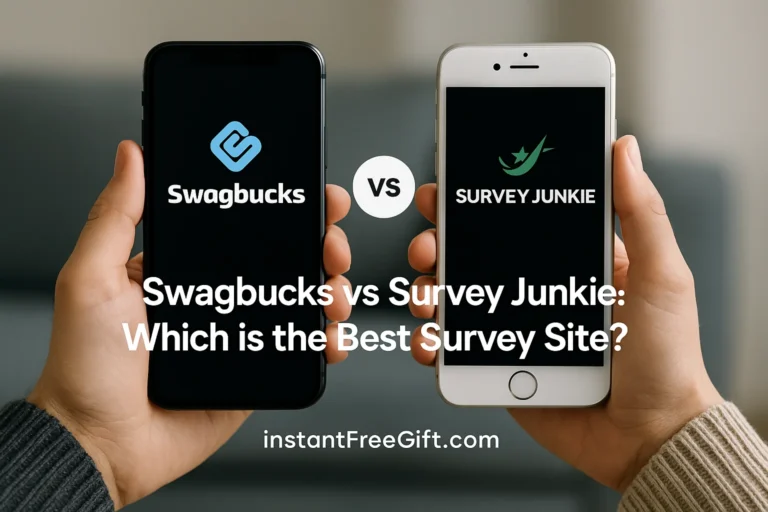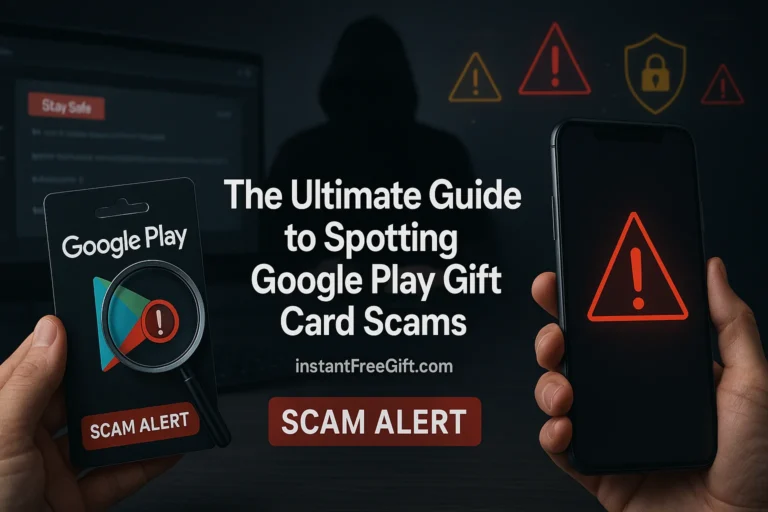PayPal Gift Card Scams (2025): Protect Yourself! [Updated Guide]
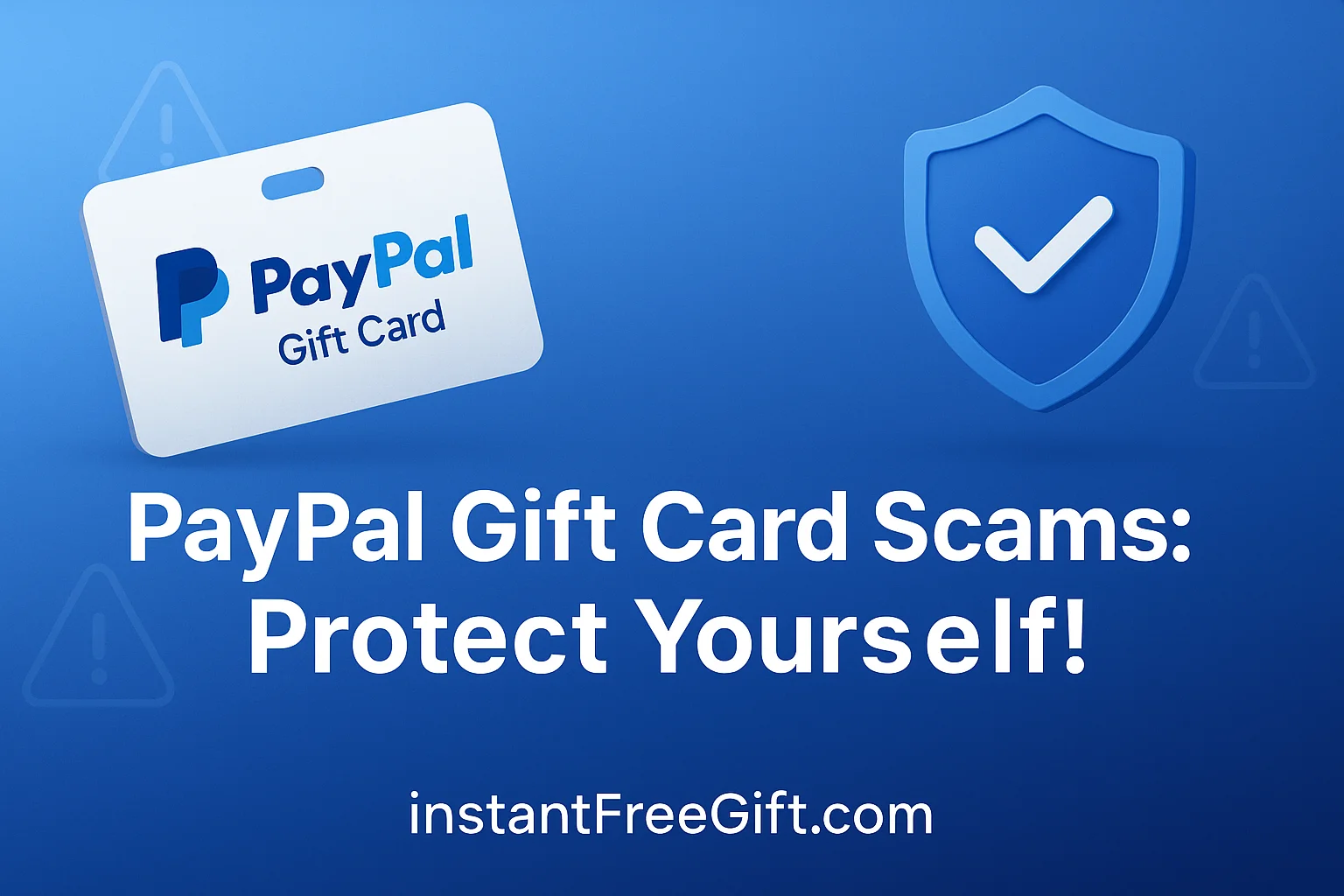
In 2024 alone, Americans lost over $158 million to PayPal gift card scams and similar gift card fraud schemes, according to the Federal Trade Commission. Even more alarming, this number represents a 40% increase from the previous year. If you’ve ever received a suspicious email about your PayPal account or been asked to make a payment using gift cards, you’re being targeted by scammers who are constantly refining their tactics.
PayPal gift card scams have become increasingly sophisticated in 2025, leaving many users vulnerable to financial loss and identity theft. Whether you’re an occasional PayPal user or rely on the platform for daily transactions, understanding these scams is crucial for protecting yourself and your hard-earned money.
In this comprehensive guide, we’ll explore the most common gift card scams PayPal users face today, reveal the warning signs that should trigger your suspicion, and provide actionable steps to safeguard yourself against these fraudulent schemes. By the end of this article, you’ll have the knowledge needed to confidently navigate the digital payment landscape and avoid becoming another victim statistic.
What are PayPal Gift Card Scams?
PayPal gift card scams are fraudulent schemes where criminals manipulate victims into purchasing gift cards and sharing the card information under false pretenses. These scams typically involve impersonating PayPal representatives, government officials, tech support agents, or romantic interests to create a sense of urgency or emotional connection that clouds the victim’s judgment.
The core element that defines these scams is the request for payment specifically via gift cards – a payment method that offers anonymity to scammers and provides virtually no recourse for victims once the transaction is complete. Unlike legitimate PayPal transactions, gift card payments cannot be reversed or traced easily, making them the preferred currency for fraudsters.
Why are They So Prevalent?
Several factors contribute to the widespread nature of PayPal gift card scams:
- Untraceable transactions: Once a gift card code is shared, the money can be spent or transferred immediately, leaving virtually no digital trail.
- Psychological manipulation: Scammers excel at creating scenarios that trigger emotional responses – fear, excitement, compassion – causing victims to act quickly without careful consideration.
- Lack of consumer education: Many people remain unaware that legitimate organizations never request payment through gift cards.
- Global reach: Online scammers can operate from anywhere in the world, making legal enforcement difficult.
- Low entry barriers: Executing these scams requires minimal technical expertise and startup costs compared to other fraud schemes.
According to recent data from the FTC, gift card scams PayPal users face have increased by 270% since 2020, with the average victim losing approximately $1,000.
How PayPal Gift Cards Should Be Used (The Legitimate Use Case)
Before diving into scam scenarios, it’s important to understand the legitimate uses of PayPal gift cards:
Legitimate Uses of PayPal Gift Cards:
- Personal gifting: Giving PayPal gift cards to friends and family for birthdays, holidays, or special occasions
- Business incentives: Companies rewarding employees or customers
- Online purchases: Using gift cards to shop at merchants that accept PayPal
- Budget management: Using gift cards to limit spending on specific platforms
Key characteristics of legitimate PayPal gift card transactions:
- No pressure or urgency to make a purchase
- No requests to keep the transaction secret
- Clear, transparent communication about the purpose of the gift card
- No requests to share the gift card numbers or PINs with strangers
- Purchased from authorized retailers or directly from PayPal
Understanding these legitimate uses helps establish a baseline for recognizing when a situation deviates into potential scam territory.
Common Types of PayPal Gift Card Scams (Detailed Explanations)
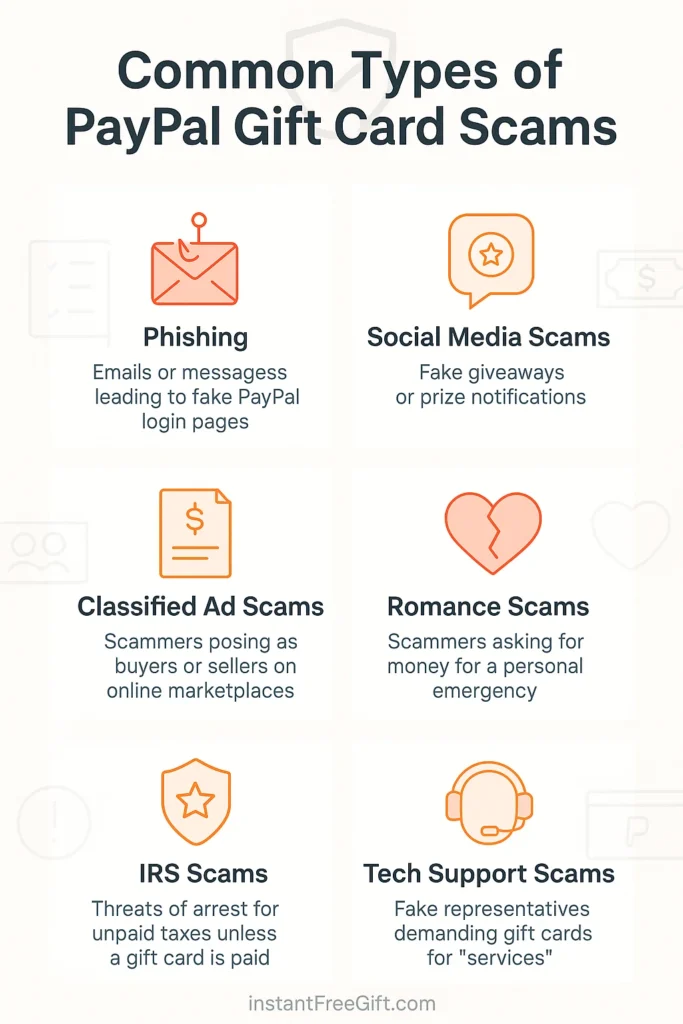
Phishing Emails and Websites
The PayPal phishing email scam remains one of the most common methods fraudsters use to access accounts and extract money through gift cards.
How it works:
- You receive an official-looking email claiming to be from PayPal
- The message typically warns about “unauthorized activity” or “account limitations”
- It directs you to click a link to “verify your account” or “restore access”
- The link leads to a fake PayPal login page designed to steal your credentials
- After capturing your login details, scammers may directly access your PayPal funds or use your compromised account to request gift cards from your contacts
Real-life example:
“I received an email saying my PayPal account had been limited due to suspicious activity. The email looked legitimate with PayPal’s logo and formatting. After clicking the link and entering my information, I later discovered my account had been emptied and the scammer had purchased $2,000 in gift cards.”
– Maria T., Chicago
Red flags to watch for:
- Generic greetings like “Dear Customer” instead of your name
- Urgent requests demanding immediate action
- Email addresses that look similar to but aren’t exactly “@paypal.com”
- Links that lead to URLs with slight misspellings (e.g., “paypall.com” or “pay-pal.com”)
- Poor grammar or spelling errors
- Requests for sensitive information PayPal already has
Social Media Scams
Fraudsters have increasingly turned to social media platforms to execute PayPal gift card scams, often leveraging the built-in trust and network effects these platforms provide.
How it works:
- Scammers create fake PayPal promotional posts or giveaways on platforms like Facebook, Instagram, or Twitter
- They promise significant rewards (e.g., “Get a $500 PayPal balance by participating in our gift card exchange program!”)
- To “verify your eligibility,” they request you purchase gift cards and share the codes
- Alternatively, they may hack legitimate accounts and message their friends about “amazing PayPal opportunities”
Real-life example:
“I saw a post from PayPal’s official-looking page offering to double any gift card amount loaded to my account as part of a promotion. After purchasing and sending the gift card information, the page disappeared completely.”
– James L., Austin
Red flags to watch for:
- Promotional offers that seem too generous to be realistic
- Pages with few followers or recently created accounts
- Requests to send gift card information via direct message
- Poor quality graphics or misuse of PayPal’s logo
- No verification links to official PayPal social channels
- Comments disabled or filled with suspicious positive reviews
Online Classifieds Scams
Marketplace and classified websites are fertile ground for gift card scams PayPal users should be wary of when buying or selling items.
How it works:
- When selling: A “buyer” expresses interest in your item and offers to pay via PayPal
- They send a fake PayPal confirmation email claiming the payment is “pending”
- The email states that to “release” the funds, you must purchase gift cards and send the information as “verification”
- When buying: A “seller” offers an item at an attractive price but claims they can only accept PayPal gift cards due to “account issues”
Red flags to watch for:
- Requests to go outside the platform’s recommended payment system
- Buyers willing to pay above asking price (too good to be true)
- Claims about special procedures needed to “release” funds
- Excuses about why they can’t accept normal PayPal payments
- Unwillingness to meet in person or talk on the phone
- Pressure to complete the transaction quickly
Romance Scams
Perhaps the most emotionally devastating, the gift card romance scam combines financial fraud with emotional manipulation.
How it works:
- Scammers create fake dating profiles using attractive photos and compelling backstories
- They invest weeks or months building an emotional connection and trust
- Once established, they manufacture an “emergency” (medical issue, travel problem, legal trouble)
- They claim they need temporary financial help via gift cards because of problems with their bank account
- They promise to repay but disappear once the gift cards are received
According to recent FBI data, romance scams involving gift cards have increased by 65% in the past year, with PayPal gift cards being among the most requested.
Real-life example:
“After three months of what I thought was a genuine relationship, my online boyfriend claimed he was stranded at an airport and needed PayPal gift cards to book a new flight. He promised to pay me back double when he arrived. I sent $1,200 in gift cards before realizing it was all fabricated.”
– Susan M., Portland
Red flags to watch for:
- Reluctance or inability to video chat or meet in person
- Professing deep feelings unusually quickly
- Frequent stories about financial hardships
- Requests for financial help, especially via gift cards
- Claims about being in the military or working overseas
- Elaborate explanations about why they can’t use normal banking
IRS/Government Impersonation Scams
Government impersonation remains one of the most intimidating PayPal gift card scams because it leverages authority and fear.
How it works:
- You receive a call, email, or text claiming to be from the IRS, Social Security Administration, or other government agency
- The scammer claims you owe money, have a warrant for your arrest, or face deportation
- They insist immediate payment via PayPal gift cards is the only way to resolve the issue
- They may keep you on the phone while you purchase gift cards to maintain control and prevent you from verifying their claims
Red flags to watch for:
- Government agencies never request payment via gift cards
- Threatening language or intimidation tactics
- Caller ID that appears to be from a government agency (these can be spoofed)
- Instructions not to tell anyone about the payment
- Demands for immediate payment without written documentation
Tech Support Scams
Tech support scams targeting PayPal users employ sophisticated tactics to convince victims their accounts or computers are compromised.
How it works:
- You receive a pop-up message, email, or call claiming to be from PayPal’s security team
- The message warns your account has been compromised or your computer has issues
- The “support representative” offers to fix the problem but requires payment via gift cards
- They may request remote access to your computer, potentially installing malware
Real-life example:
“A popup appeared on my screen with the PayPal logo saying my account was compromised. When I called the number provided, the ‘technician’ spent an hour showing me fake evidence of ‘hackers’ in my system. He said the only way to remove them was to pay with PayPal gift cards because the regular payment system was ‘corrupted’.”
– Robert J., Miami
Red flags to watch for:
- Unsolicited contact claiming to be from technical support
- Requests for remote access to your computer
- Technical jargon designed to confuse and intimidate
- Pressure to make immediate decisions
- Payment requests specifically for gift cards
Red Flags: How to Spot a PayPal Gift Card Scam
While scam tactics continually evolve, these universal warning signs can help you protect yourself from scams related to PayPal gift cards:
| Red Flag | What It Means | Example |
|---|---|---|
| Gift card payment requests | Legitimate organizations never require gift cards as payment | “To unlock your account, purchase $500 in gift cards” |
| Urgency and pressure | Scammers don’t want you to have time to think or verify | “You must pay within 1 hour or face arrest” |
| Requests for secrecy | Isolation prevents outside perspective | “Don’t tell anyone about this transaction” |
| Poor grammar/spelling | Often indicates overseas scam operations | Emails with awkward phrasing or obvious errors |
| Suspicious links | Lead to credential-stealing websites | URLs that are similar to but slightly different from paypal.com |
| Unsolicited contact | Legitimate services rarely contact you first | Random calls claiming to be PayPal security |
| Threats or intimidation | Legitimate businesses don’t threaten customers | “Failure to pay will result in legal action” |
| Too-good-to-be-true offers | If it sounds too good to be true, it usually is | “Pay $100 in gift cards to receive $1,000” |
| Unusual payment methods | Requests that deviate from normal procedures | “We can only accept gift cards for this special offer” |
| Emotional manipulation | Appeals to fear, excitement, or compassion | “I’m stranded and you’re my only hope” |
The Gift Card Rule: Remember this simple guideline – if anyone asks you to pay for anything using gift cards, it’s almost certainly a scam. Legitimate businesses, government agencies, and tech support services never request payment via gift cards.
Protecting Yourself: Steps to Take to Avoid Scams
Staying safe from PayPal gift card scams requires both awareness and proactive measures:
General Security Practices
- Enable two-factor authentication on your PayPal account for an extra layer of security
- Create unique, complex passwords for your PayPal account and change them regularly
- Keep your software updated on all devices used to access PayPal
- Check account statements regularly to quickly identify unauthorized transactions
- Verify all communications directly through official channels (call PayPal’s official number)
- Install reputable security software on your devices
When Dealing with Potential Scams
- Slow down and think critically – legitimate organizations don’t demand immediate action
- Never share gift card numbers or PINs with anyone you don’t absolutely trust
- Verify identities independently – don’t use contact information provided in suspicious messages
- Trust your instincts – if something feels wrong, it probably is
- Remember the gift card rule – no legitimate business or agency accepts gift cards as payment
- Discuss suspicious requests with trusted friends or family before taking action
Essential Resources for Verification:
- Official PayPal Security Page: Always navigate directly to PayPal’s Security Center by typing the URL yourself
- PayPal Customer Service: Call 1-888-221-1161 to verify any communication claiming to be from PayPal
- FTC Consumer Advice: Visit IdentityTheft.gov for guidance on protecting your identity
What to Do If You’ve Been Scammed
If you’ve fallen victim to a PayPal gift card scam, taking quick action may help limit the damage:
Immediate Steps:
- Contact PayPal directly through their official website or app to report the scam and secure your account
- Phone: 1-888-221-1161
- Online: PayPal Resolution Center
- Report to the gift card issuer immediately – while rare, some companies may be able to freeze funds if they haven’t been spent
- Keep the gift card and receipt as evidence
- File a report with the Federal Trade Commission (FTC)
- Visit ReportFraud.ftc.gov
- Call: 1-877-FTC-HELP (1-877-382-4357)
- Report to local law enforcement
- File a police report, which may be necessary for identity theft cases
- Request a copy of the report for your records
- Document everything
- Save all communications with the scammer
- Record dates, times, phone numbers, email addresses, and websites involved
- Take screenshots of any relevant information before it disappears
Additional Recovery Steps:
- Change all passwords associated with your PayPal account and email
- Monitor your credit reports for suspicious activity
- Alert your bank and credit card companies if your financial information was compromised
- Consider placing a fraud alert on your credit file with the major credit bureaus
- Report the scam to the Internet Crime Complaint Center (IC3) at www.ic3.gov
While recovery of funds lost to gift card scams is rare, reporting helps authorities track patterns and potentially prevent future scams.
Additional Resources
For those seeking more information on how to spot gift card scams and protect themselves, these resources provide valuable guidance:
- PayPal Security Center – Official resources from PayPal on staying safe online
- Federal Trade Commission (FTC) – Government information on gift card scams and reporting procedures
- Better Business Bureau (BBB) Scam Tracker – Database of reported scams to check if others have encountered similar situations
- IdentityTheft.gov – Step-by-step recovery plans if your identity has been compromised
- AARP Fraud Resource Center – Educational resources particularly helpful for senior citizens
- Legitimate Ways to Earn PayPal Gift Cards – Our guide on genuine methods to earn PayPal rewards
- Fake Survey Sites – Information on avoiding survey scams that often involve gift cards
Conclusion
PayPal gift card scams continue to evolve in sophistication, but the fundamental red flags remain consistent. The most important rule to remember is simple: legitimate organizations never require payment via gift cards. If someone is pressuring you to purchase gift cards – regardless of their story – you’re almost certainly dealing with a scammer.
Staying vigilant doesn’t mean living in fear. Rather, it means approaching unusual requests with healthy skepticism and taking the time to verify before acting. By understanding the tactics scammers use and the warning signs to watch for, you’ve already taken the most important step toward protecting yourself.
Remember that knowledge is your best defense. Share this information with friends and family, particularly those who may be more vulnerable to such scams. By spreading awareness, you’re not just protecting yourself but also helping to create a community that’s more resilient to fraud.
Have you encountered a PayPal gift card scam attempt? Share your experience in the comments below to help others recognize similar situations and stay safe.
This article was last updated on April 2025, with the latest information on PayPal gift card scams. While we strive to provide current and accurate information, scam tactics evolve continuously. Always verify suspicious communications directly with PayPal through their official channels.



